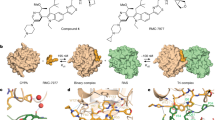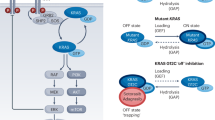Abstract
Colon cancer is the most aggressive tumor in both men and women globally. As many the chemotherapeutic regimens have adverse side effects and contribute to the resistance and recurrence, therefore, finding novel therapeutic targets and developing effective agents are urgent. Based on the TCGA and GTEx database analysis, RSK1 and MSK2 were found abnormal expressed in colon cancer. RSK1 and MSK2 were overexpressed in colon cancer tissues confirmed by western blot and IHC. After knocking down RSK1 or MSK2, cell proliferation and anchorage-independent cell growth were markedly inhibited. Using a computer docking model, we identified a novel dual-target inhibitor, APIO-EE-07, that could block both RSK1 and MSK2 kinase activity in a dose-dependent manner. APIO-EE-07 inhibited cell growth and induced apoptosis and also increased expression of Bax as well as cleaved caspase-3 and -PARP in colon cancer cells by downregulating RSK1 and MSK2 downstream targets, including CREB and ATF1. Furthermore, APIO-EE-07 decreased tumor volume and weight in human patient-derived xenografts tumors implanted in SCID mice. In summary, our results demonstrate that RSK1 and MSK2 are the potential targets for the treatment of colon cancer. APIO-EE-07, a novel dual-target inhibitor of RSK1 and MSK2, can suppress the growth of colon cancer by attenuating RSK1 and MSK2 signaling.
This is a preview of subscription content, access via your institution
Access options
Subscribe to this journal
Receive 50 print issues and online access
$259.00 per year
only $5.18 per issue
Buy this article
- Purchase on Springer Link
- Instant access to full article PDF
Prices may be subject to local taxes which are calculated during checkout








Similar content being viewed by others
References
Siegel RL, Miller KD, Fedewa SA, Ahnen DJ, Meester RGS, Barzi A, et al. Colorectal cancer statistics, 2017. CA Cancer J Clin. 2017;67:177–93.
Ferlay J, Soerjomataram I, Dikshit R, Eser S, Mathers C, Rebelo M, et al. Cancer incidence and mortality worldwide: sources, methods and major patterns in GLOBOCAN 2012. Int J Cancer. 2015;136:E359–386.
Jideh B, Bourke MJ. Colorectal cancer screening reduces incidence, mortality and morbidity. Med J Aust. 2018;208:483–4.
Pearson G, Robinson F, Beers Gibson T, Xu BE, Karandikar M, Berman K, et al. Mitogen-activated protein (MAP) kinase pathways: regulation and physiological functions. Endocr Rev. 2001;22:153–83.
Anjum R, Blenis J. The RSK family of kinases: emerging roles in cellular signalling. Nat Rev Mol Cell Biol. 2008;9:747–58.
De Cesare D, Jacquot S, Hanauer A, Sassone-Corsi P. Rsk-2 activity is necessary for epidermal growth factor-induced phosphorylation of CREB protein and transcription of c-fos gene. Proc Natl Acad Sci USA. 1998;95:12202–7.
Liu K, Cho YY, Yao K, Nadas J, Kim DJ, Cho EJ, et al. Eriodictyol inhibits RSK2-ATF1 signaling and suppresses EGF-induced neoplastic cell transformation. J Biol Chem. 2011;286:2057–66.
Lara R, Seckl MJ, Pardo OE. The p90 RSK family members: common functions and isoform specificity. Cancer Res. 2013;73:5301–8.
Strelkov IS, Davie JR. Ser-10 phosphorylation of histone H3 and immediate early gene expression in oncogene-transformed mouse fibroblasts. Cancer Res. 2002;62:75–78.
Romeo Y, Zhang X, Roux PP. Regulation and function of the RSK family of protein kinases. Biochem J. 2012;441:553–69.
Clark DE, Errington TM, Smith JA, Frierson HF Jr, Weber MJ, Lannigan DA. The serine/threonine protein kinase, p90 ribosomal S6 kinase, is an important regulator of prostate cancer cell proliferation. Cancer Res. 2005;65:3108–16.
Ludwik KACJ, Li M, Li Y, Sandusky ZM, Pasic L, Sowder ME, et al. Development of a RSK inhibitor as a novel therapy for triple-negative breast cancer. Mol Cancer Ther. 2016;15:2598–608.
Deak M, Clifton AD, Lucocq JM, Alessi DR, Lucocq LM, Alessi DR. Mitogen- and stress-activated protein kinase-1 (MSK1) is directly activated by MAPK and SAPK2/p38, and may mediate activation of CREB. EMBO J. 1998;17:4426–41.
Reyskens KM, Arthur JS. Emerging roles of the mitogen and stress activated kinases MSK1 and MSK2. Front Cell Dev Biol. 2016;4:56.
Giselle R, Wiggin AS, Foster JuliaM, Murray-Tait Victoria, Philip Cohen aJSCA. Required for the mitogen- and stress-induced phosphorylation of CREB and ATF1 in fibroblasts. Mol Cell Biol. 2002;8:2871–81.
Arthur JSFA, Dwyer JM, Davare M, Reese E, Obrietan K, Impey S. Mitogen- and stress-activated protein kinase 1 mediates cAMP response element-binding protein phosphorylation and activation by neurotrophins. J Neurosci. 2004;18:4324–32.
Yao KCH, Liu K, Langfald A, Yang G, Zhang Y, Yu DH, et al. Kaempferol targets RSK2 and MSK1 to suppress UV radiation-induced skin cancer. Cancer Prev Res. 2014;7:958–67.
iu H1YJ, Liu Q, Jin C, Wu S, Lu X, Zheng L, et al. Lanthanum chloride impairs spatial memory through ERK/MSK1 signaling pathway of hippocampus in rats. Neurochemistry. 2014;39:2479–91.
Hidalgo MAF, Biankin AV, Budinska E, Byrne AT, Caldas C, Clarke RB, et al. Patient-derived xenograft models: an emerging platform for translational cancer research. Cancer Discov. 2014;4:998–1013.
Lee YT, Tan YJ, Oon CE. Molecular targeted therapy: treating cancer with specificity. Eur J Pharm. 2018;834:188–96.
Bode AM, Dong Z. Recent advances in precision oncology research. NPJ Precis Oncol. 2018;2:11.
Lara RSM, Pardo OE. The p90 RSK family members: common functions and isoform specificity. Cancer Res. 2013;73:5301–8.
Cargnello MRP. Activation and function of the MAPKs and their substrates, the MAPK-activated protein kinases. Microbiol Mol Biol Rev. 2011;75:50–83.
Smith JA, Poteet-Smith CE, Xu Y, Errington TM, Hecht SM, Lannigan DA. Identification of the first specific inhibitor of p90 ribosomal S6 kinase (RSK) reveals an unexpected role for RSK in cancer cell proliferation. Cancer Res. 2005;65:1027–34.
Tan Y, Ruan H, Demeter MR, Comb MJ. p90(RSK) blocks bad‐mediated cell death via a protein kinase C‐dependent pathway. J Biol Chem. 1999;49:34859–67.
Xian W1PL, Pandya D, Selfors LM, Derksen PW, de Bruin M, Gray NS, et al. Fibroblast growth factor receptor 1‐transformed mammary epithelial cells are dependent on RSK activity for growth and survival. Cancer Res. 2009;6:2244–51.
Ulrik Doehn CH, Frank ScottR, Jensen ClausJ, Duda Katarzyna, Jakob V, Nielsen MSC, et al. RSK is a principal effector of the RAS‐ERK pathway for eliciting a coordinate promotile/invasive gene program and phenotype in epithelial cells. Mol Cell. 2009;4:511–22.
Rodríguez-Antona C, Pallares J, Cristina Montero-Conde C, Inglada-Pérez L, Castelblanco E, Landa I, et al. Overexpression and activation of EGFR and VEGFR2 in medullary thyroid carcinomas is related to metastasis. Endocr Relat Cancer. 2010;17(1):7–16.
Ye D, Shi Y, Xu Y, Huang J. PACAP attenuates optic nerve crush-induced retinal ganglion cell apoptosis via activation of the CREB-Bcl-2 pathway. J Mol Neurosci. 2019;68:475–84.
Houles T, Roux PP. Defining the role of the RSK isoforms in cancer. Semin Cancer Biol. 2018;48:53–61.
Hutchinson LKR. High drug attrition rates—where are we going wrong? Nat Rev Clin Oncol. 2011;8:189–90.
Markad SB, Argade NP. Diversity oriented convergent access for collective total synthesis of bioactive multifunctional carbazole alkaloids: synthesis of carbazomycin A, carbazomycin B, hyellazole, chlorohyellazole, and clausenaline D. Org Lett. 2014;16:5470–3.
Guoguo Jin KY, Guo Zhiping, Zhao Zhenjiang, Liu Kangdong, Liu Fangfang, Chen Hanyong, et al. APIO-EE-9 is a novel Aurora A and B antagonist that suppresses esophageal cancer growth in a PDX mouse model. Oncotarget. 2017;8:53387–404.
Roig AI, Eskiocak U, Hight SK, Kim SB, Delgado O, Souza RF, et al. Immortalized epithelial cells derived from human colon biopsies express stem cell markers and differentiate in vitro. Gastroenterology. 2010;138:1012–1021 e1011-1015.
Schrödinger. Schrödinger Suite 2019. LLC, New York, NY: Schrödinger; 2019.
Berman HM, Westbrook J, Feng Z, Gilliland G, Bhat TN, Weissig H, et al. The protein data bank. Nucleic Acids Res. 2000;28:235–42.
Funding
This work was supported by the Key Science and Technology Program of Henan Province, China (182102310125) and the Key program of TCM research in Henan Province, China (2018ZY1016, 2019ZY1037).
Author information
Authors and Affiliations
Contributions
GJ, KY, ZG, and ZD designed this study. GJ, MY, and KL performed the experiment, analyzed data, and prepared figures. KD and DG synthesis chemicals. HC contributed to computational analysis. KL analyzed of GEPIA database. ZJ and YY performed some explements. GJ wrote paper and ZD revised the paper.
Corresponding authors
Ethics declarations
Conflict of interest
The authors declare that they have no conflict of interest.
Additional information
Publisher’s note Springer Nature remains neutral with regard to jurisdictional claims in published maps and institutional affiliations.
Rights and permissions
About this article
Cite this article
Jin, G., Yan, M., Liu, K. et al. Discovery of a novel dual-target inhibitor against RSK1 and MSK2 to suppress growth of human colon cancer. Oncogene 39, 6733–6746 (2020). https://doi.org/10.1038/s41388-020-01467-w
Received:
Revised:
Accepted:
Published:
Issue Date:
DOI: https://doi.org/10.1038/s41388-020-01467-w
This article is cited by
-
Repurposed benzydamine targeting CDK2 suppresses the growth of esophageal squamous cell carcinoma
Frontiers of Medicine (2023)



